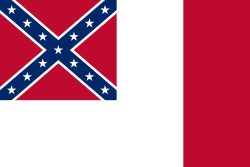šżÄňłęňáůŔü»šŤčňťő
šżÄňłęňáůŔü»šŤčňťő´╝łŔő▒Ŕ¬×´╝ÜConfederate States of America´╝îCSA´╝ë´╝îňĆŽšĘ▒šżÄňłęňáůÚéŽŔü»ŃÇüňŹŚŠľ╣ÚéŽŔü»ŠłľŔ┐¬ňůőŔą┐´╝łÚÇÜń┐ŚŔ¬¬Š│Ľ´╝ë´╝îš░íšĘ▒Ŕü»šŤčňťőŃÇüÚéŽŔü»´╝łConfederate States´╝ë´╝»Ŕç¬1861ň╣┤Ŕç│1865ň╣┤šö▒11ńެšżÄňŤŻňŹŚŠľ╣Ŕôäňą┤ňĚ×ň«úňŞâń╗ÄŔü»ÚéŽňłćŔúéŔÇîňç║šÜäŠö┐ŠŁâ´╝îšö▒ń╗ŐňĄęšżÄňťőňŹŚÚâĘšÜäńŞÇÚâĘňłćňť░ňččš╗䊳ÉŃÇé[5]Ŕ笚żÄňłęňáůŔü»šŤčňťőňľ«Šľ╣ÚŁóšŹĘšźőń╣őňżîščşŠÜźňşśňťĘšÜ䊝čÚľôňćů´╝îńŞÇšŤ┤Ŕłçňľ╣ń║Üń╝»Šő뚯Ľ┬̊׌Ŕé»Úóćň░ÄšÜäŔü»Ú鎊ö┐ň║ťÚÇ▓ŔíîňůžŠł░´╝îňĄžňĄÜŔÖĽŠľ╝Úś▓šŽŽŠůőňőó´╝îňƬŠťëšżůń╝»šë╣┬ĚŠŁÄň░çŔ╗ŹÚ║żńŞőšÜäňºňÉëň░╝ń║×Ŕ╗ŹňťśŠŤżščşŠÜźšÜäňůąńżÁňľ╣šÜäŔü»ÚéŽÚÖúšçčÚáśňťč´╝îń╣čšö▒ń║Äń║ĄŠłśňÄčňŤáńŞŽšäíšó║ňłçšÜäňîŚÚâĘÚéŐšĽî´╝îňůÂňŹŚÚâĘÚéŐšĽîŔłçňóĘŔą┐ňôąňĽîńŞÇŔç┤´╝▒Ŕą┐ÚéŐšĽîňë犜»ňóĘŔą┐ňôąšüúňĺîňĄžŔą┐Š┤őŃÇé[5]1865ň╣┤ŔüöšŤčňŤŻňťĘňůžŠł░ńŞşňĄ▒ňłęŔÇîŠ╗ůń║í´╝îňŹŚŠľ╣ňÉäňĚ×ÚÖŞš║îÚçŹŔ┐öŔü»Ú鎴╝îšżÄňťőÚ珊ľ░šÁ▒ńŞÇŃÇé ŠşĚňĆ▓1861ň╣┤2Šťł4ŠŚą´╝ëÚĹĹŠľ╝ń║×ń╝»Šő뚯Ľ┬̊׌Ŕé»ňťĘšĘŹŠŚęšÜäÚüŞŔłëńŞşšĽÂÚüŞšé║šżÄňťőšŞŻšÁ▒´╝îšżÄňťőňŹŚÚâĘńŞâňÇőŔôäňą┤ňĚ×´╝łňŹŚňŹíšżůŔÉŐÚéúňĚ×ŃÇüň»ćŔą┐Ŕą┐Š»öňĚ×ŃÇüńŻŤšżůÚçîÚüöňĚ×ŃÇüÚś┐ŠőëňĚ┤ÚŽČňĚ×ŃÇüńŻÉŠ▓╗ń║×ňĚ×ŃÇüŔĚ»ŠśôŠľ»ň«ëÚéúňĚ×ŔłçňżĚňůőŔľęŠľ»ňĚ×´╝ëňůłňżîŔäźÚŤóšżÄňťő´╝ɚźőŔçĘŠÖéŔş░ŠťâŃÇé2Šťł8ŠŚą´╝îň«úňŞâŠłÉšźőšżÄňłęňáůŔü»šŤčňťő´╝łCSA´╝ë´╝îňĆłšĘ▒šżÄňłęňáůÚéŽŔü»ŃÇéńżŁšůžšżÄňłęňáůŔü»šŤčňťőŠć▓Š│Ľ´╝îŠČ튌ąÚÇëňç║ňéĹńŻŤÚüť┬ĚŠł┤šÂşŠľ»šé║ÚŽľń╗╗šżÄňłęňáůŔü»šŤčňťőšŞŻšÁ▒ŃÇé ňżĚňůőŔľęŠľ»ňĚךŤ┤ňł░3Šťł2ŠŚąŠëŹňŐáňůąŔü»šŤčňťő´╝îńŞŽŠĺĄŠĆŤňůŠőĺšÁĽň«úŔ¬ôŠôüŔşĚŔü»šŤčňťőšÜäňĚ×ÚĽĚň▒▒ňžć┬Ěń╝ĹŠľ»ÚáôŃÇéÚÇÖńŞâňĚ×ŔäźÚŤóšżÄňťőńŞŽŠÄžňłÂňóâňůžšÜäŠÁĚÚÖŞŔ╗ŹŃÇüŠŞ»ňĆúńŞÄŠÁĚÚŚť´╝îňż×ŔÇîň╝Ľšłćń║ćňŹŚňł░šłşŃÇé ńŞÇňÇőŠťłń╣őňżî´╝îŠ×ŚŔ黊ľ╝1861ň╣┤3Šťł4ŠŚąň«úŔ¬ôň░▒ŔüĚšé║šżÄňťőšŞŻšÁ▒ŃÇéňťĘň░▒ŔüĚŠ╝öŔ¬¬ńŞş´╝îń╗ľŠîçňç║šżÄňťőŠć▓Š│ĽŠ»öňůłň돚ÜäÚéŽŔü»ŠóŁńżőňőżňőĺňç║ŃÇ┤ň«îŠĽ┤šÜäŔü»ÚéŽŃÇŹ´╝îšé║ňůĚš┤䊣čňŐŤšÜäšźášĘő´╝îŔÇîňŹŚŠľ╣šÜäňłćÚŤóšé║ŃÇîšäíŠ│ĽňżőŠĽłňŐŤŃÇŹŃÇéń╗ľŔíĘšĄ║šäíŠäĆňůąńżÁňŹŚŠľ╣ŔźŞňĚ×´╝îńŻćň░çňőĽšöĘŠşŽňŐŤń╗ąšÂşŔşĚšżÄňťőŠëÇŔŻäšÜäŠęčÚŚťŔłçÚáśňťčŃÇéń╗ľšÜäŠ╝öŔ¬¬ń╗ąňĹ╝š▒▓šżÄňťőŠşŞńŞÇńŻťšÁÉŃÇé 4Šťł12ŠŚą´╝îňŹŚňŹíšżůŔÉŐÚéúňĚ×ňÉĹňůžÚžÉŠčąšłżŠľ»ÚáôŔľęňžćšë╣ňáíšÜäňÉłšťżňťőŔ╗ŹÚÜŐÚľőšüź´╝îŔ┐źňůŠռÚÖŹŃÇéŠíĹšë╣ňá튳░ňŻ╣ňżî´╝îŠ×ŚŔé»ňĆČŔźőšżÄňťőňťőňůžňůÂń╗ľňĚךÖ╝ňůÁňą¬ňŤ×ŔÉĘňžćšë╣ňáíŔłçňůÂń╗ľŔŽüňí×´╝îń┐ŁŔíŤÚŽľÚ⯴╝îńŞŽšÂşŔşĚšżÄňťőŃÇéňĄžňĄÜŠĽŞšÜäňľ╣ňĚךŤŞń┐í´╝îšżÄňťőňĆ»ÚÇ芳░ÚÇčŠ▒║š▓ëšóÄňĆŤń║é´╝ůŠ×ŚŔé»ňâůňżÁŠ▒éň┐ŚÚíśňůÁńŻťŠł░90ňĄęŃÇéšÁɊםň░ÄŔç┤ň╝ŚňÉëň░╝ń║ÜňĚ×ŃÇüÚś┐Ŕé»Ŕë▓ňĚ×ŃÇüšö░š┤ŹŔą┐ňĚ×ŃÇüŔłçňîŚňŹíšżůŔÉŐÚéúňĚ×ňŤŤňĚ×ŔíĘŠ▒║ŔäźÚŤóšżÄňťőŔü»Ú鎴╝îňŐáňůąšżÄňłęňáůÚéŽŔü»´╝îńŻ┐ňůÂňĚ׊ĽŞňó×ňŐáňł░11ňÇőŃÇéňťĘšÂşňÉëň░╝ń║×ňĚ×ňŐáňůąňżî´╝îŔü»šŤčňťőň░çÚŽľÚâŻňż×Úś┐ŠőëňĚ┤ÚŽČňĚ×ŔĺÖňôąÚŽČňłęÚüĚŔç│ň╝ŚňÉëň░╝ń║×ňĚךÜäÚçîňúźŠ╗┐ŃÇé ň»ćŔśçÚçîňĚ×ŔłçŔé»ňíöňč║ňĚ׊ö┐ň║ťš╣╝š║ÖňťĘňÉłń╝ŚňŤŻňůž´╝îńŻćňůęňĚ×ňůžšÜ䊼Áň░ŹŠ┤żš│╗ŔóźŔü»šŤčňťőŠőŤŠöČ´╝îŠëÇń╗ąŔü»šŤčňťőŠłÉňôíňĚ׊ĽŞŠťëŠÖéŔóźŔŽľšé║13ňÇőŃÇé ňŹ░šČČň«ëÚáśňť░´╝łňżîńżćšÜäń┐äňůőŠőëŔŹĚÚęČňĚ×´╝ëńŞŐšÜäń║öňÇőÚâĘŔÉŻŠö┐ň║ťńŞ╗ŔŽüń╣芜»Šö»ŠîüŔü»šŤčňťőŃÇ銾░ňóĘŔą┐ňôąÚáśňť░ňŹŚÚâĘ´╝łňîůňÉźŔôőŔî▓šÖ╗Ŕ│╝ňť░´╝ëňŐáňůąŔü»šŤčňťő´╝ɚé║ń║׊şĚŠíĹÚéúň▒Čňť░ŃÇéňůÂÚŽľŠë╣šž╗ň▒ůŔÇůŔźőÚíś´╝îŔŽüŠ▒éŔü»šŤčňťőŠö┐ň║ťŠşŞńŻÁňůÂňťčňť░´╝îńŞŽń┐âńŻ┐ŠÄóÚܬŔÇâŠčąň̻34ň║Žń╗ąňŹŚň▒ČŔü»šŤčňťőš«íŔŻäšÜäňŹÇňččŃÇéń║׊şĚŠíĹÚéúŔ╗ŹÚÜŐšÂôň«śŠľ╣Šë┐Ŕ¬Źšé║Ŕü»šŤčňťőšÜ䊺ŽŔúŁňŐŤÚçĆŃÇé ń║Ęňłę┬ĚÚťŹŠÖ«ń║ČŠľ»┬ĚňŞîń╝»ňłęň░çŔ╗ŹňťĘňůŠľ░ňóĘŔą┐ňôąŠťâŠł░ń╣őň돴╝îň░ŹŠľ░ňóĘŔą┐ňôąň▒ůŠ░ĹšÖ╝ńŻłň«úŔĘÇ´╝îń╝üňťľň░çń╗ľň░ŹŔę▓ň▒ČńŞ╗šÜäš«íŔŻäŠČŐŠşŞňůąšżÄňłęňáůŔü»šŤčňťőňÉŹńŞőŃÇéŔü»šŤčŔ╗ŹňťĘ1862ň╣┤3Šťł13ŠŚąŔç│4Šťł8ŠŚąń╣őÚľôščşŠÜźšÜäńŻöÚáśŔę▓ňť░ÚŽľň║ťŔüľňíöŔĆ▓ŃÇé Ŕôäňą┤ňĚ×ńŞŽŠť¬ňůĘňŐáňůąŔü»šŤčňťőŃÇé1861ň╣┤ÚŽČÚçîŔśşňĚ×ň«úńŻłŔ╗Źń║őŠłĺňÜ┤´╝łŔę▓ňĚ×ŔłçňÉłšťżňťőÚŽľÚâŻŔĆ»šŤŤÚáôšë╣ňŹÇńŞëÚŁóÚä░ŠÄą´╝ëń╗ąÚś▓ŔäźÚŤóňÉłšťżňťőŃÇéňÉîŠĘúń╣芜»Ŕôäňą┤ňĚךÜäšë╣ŠőëňŹÄňĚ×ňż×Šť¬ŔÇâŠů«ÚüÄŔäźÚŤóňÉłšťżňťőŃÇéňťĘŠł░šłşŠťčÚľô´╝îŠö»ŠîüňÉłšťżňťőšÜäÚĄśÚ╗ĘŔş░ŠťâŠľ╝1863ň╣┤ňťĘšÂşňÉëň░╝ń║ךÜäŠâáÚŁłńŞ╗ň╝ÁŔę▓ňť░ňŹÇ48ÚâíŔäźÚŤóšÂşňÉëň░╝ń║×ňĚ×ňŐáňůąňÉłšťżňŤŻ´╝ǚÁ銳ɚźőŔą┐šÂşňÉëň░╝ń║×ňĚ×ńŞŽŠłÉňŐčňŐáňůąňÉłšťżňťő´╝îňůÂňĚ׊ć▓šé║Š╝ŞÚÇ▓ň╗óÚÖĄňą┤ÚÜŞňłÂň║ŽŃÇéňůÂń╗ľŔäźÚŤóŔü»šŤčňťőšÜäń╝üňťľ´╝łšë╣ňłąňÇ╝ňżŚŠ│ĘŠäĆšÜ䊜»ŠŁ▒šö░š┤ŹŔą┐´╝ë´╝îňŤáŔü»šŤčňťőň«úńŻłŔ╗Źń║őŠłĺňÜ┤ŔÇîÚüşňłÂŠşóŃÇé 1865ň╣┤4Šťł9ŠŚą´╝îšżůń╝»šë╣┬ĚŠŁÄň░çŔ╗ŹÚ║żńŞőšÜäňºňÉëň░╝ń║×Ŕ╗ŹňťśňťĘÚś┐Š│óÚŽČŠëśňůőŠľ»Š│ĽÚÖóŠŐĽÚÖŹ´╝îńŞÇŔłČŔŽľňůšé║šżÄňłęňáůŔü»šŤčňťőšÜäšÁéšÁÉŠŚąŃÇéŔüöšŤčňŤŻšŞŻšÁ▒Šł┤šÂşŠľ»Šľ╝5Šťł10ŠŚąňťĘńŻÉŠ▓╗ń║ךÜäŠČžŠľçš╗┤ň░öŔ󟊏Ľ´╝îÚĄśńŞőšÜäŔü»šŤčňťőŔ╗ŹÚÜŐŠľ╝ňÉîň╣┤6ŠťłŠŐĽÚÖŹŃÇ銝ÇňżîńŞÇÚŁóšżÄňłęňáůŔü»šŤčňťőňťőŠŚŚŠľ╝1865ň╣┤8Šťł2ŠŚąňťĘň»ęňŹŚňĄÜń║×ŔÖčŔëŽńŞŐÚÖŹńŞőŃÇé Šö┐ň║ťŔłçŠö┐šşľŠć▓Š│ĽšżÄňłęňáůŔü»šŤčňťőŠć▓Š│ĽŠĆÉňç║ŔĘ▒ňĄÜŔžÇÚ╗×ńżćŔ¬¬ŠśÄňůÂňłćÚŤóń╣őňőĽŠęčŃÇéŔę▓Šć▓Š│Ľň╝Ěšâłňť░ńŞ╗ň╝ÁňĚ׊ČŐŃÇüšŞ«ŠŞŤńŞşňĄ«Šö┐ň║ťŠČŐÚÖÉŃÇüńŞöŠśÄŠľçŔŽĆň«Üń┐ŁŔşĚňą┤ÚÜŞňłÂň║Ž´╝îńŻćšŽüŠşóňťőÚÜŤňą┤ÚÜŞń║ĄŠśôŃÇéňůÂŔłçňÉłšťżňťőŠć▓Š│ĽŠťÇńŞ╗ŔŽüšÜäńŞŹňÉî´╝îňťĘŠľ╝ŠĽŹŔ┐░ňłćÚŤóŔźŞňĚ×ň░ŹŠľ╝šżÄňťőŔü»Ú鎊ö┐ň║ťšÜäńŞŹŠ╗┐ŃÇéńżőňŽéŔü»šŤčňťőŠö┐ň║ťšŽüŠşóÚľőňżÁń┐ŁŔşĚŠÇžÚŚťšĘů´╝îńŻ┐ňŹŚŠľ╣ňĚךÜ䊪»ňĆúň░ŹňťőÚÜŤŔ▓┐ŠśôńżćŔ¬¬ŠŤ┤ŠťëňÉŞň╝ĽňŐŤ´╝îńŻ┐ňůÂňťĘň«úňĹŐŔäźÚŤóňÉłšťżňťőšÜ䊝čÚľô´╝îňŹŚŠľ╣ňÉäňĚ×ňĄžňĄÜň░çňůÂŔŽľńŻťňó×ňŐáňŹŚŠľ╣šÜäÚľőŠö»ŔÇîŠőôň▒Ľňľ╣ňĚ×Ŕ▓íň»îšÜäŠëőŠ«ÁŃÇéŔü»šŤčňťőŠö┐ň║ťňÉîŠĘúšŽüŠşóŔŻëšöĘńŞÇňĚךÜ䊺▓ňůąńżćŠö»Šîüń╗ľňĚ×ńŻťňůžÚâĘŠö╣ňľäŃÇéšäÂŔÇîňĄžÚźöŔ¬¬ńżć´╝îŔü»šŤčňťőŠć▓Š│ĽňĄÜŠĽŞŠś»ňż×ňÄ芝ȚÜäšżÄňťőŠć▓Š│ĽÚÇÉňşŚÚÇÉňĆąŠŐäÚîäšÜäň뻊ťČŃÇé ňťĘŔü»šŤčňťőŠć▓Š│ĽŔŹëŠíłńŞşŠőĺšÁĽń║ćńŞÇń║ŤšĘ«ŠŚĆŠÇžšÜäŠĆÉŠíł´╝îňŽéňâůňůüŔĘ▒Ŕôäňą┤ňĚ×ňŐáňůąňĺîŠüóňĄŹňĄžŔą┐Š┤őňą┤ÚÜŞŔ▓┐ŠśôŃÇéŠć▓Š│ĽńŞŽŠť¬ňîůňÉźňůüŔĘ▒ňÉäňĚ×ŔäźÚŤóšÜäŠóŁŠČż´╝îňŤášé║ňŹŚŠľ╣ňÉĹńżćŔ¬Źšé║ÚÇÖŠś»ňÉäńŞ╗ŠČŐňĚךÜäňč║ŠťČŠČŐňŐŤ´╝îńŞöšżÄňťőŠć▓Š│ĽńŞŽŠť¬ŔŽüŠ▒éŠúäšÁĽń╣ő´╝îňÇśŔőąňîůňÉźÚÇÖŠĘúšÜäŠóŁŠČżń║Žň░çňëŐň╝▒ňÄčňůłŔäźÚŤóšżÄňťőšÜäńŞ╗ň╝ÁŃÇé Ŕü»šŤčňťőšŞŻšÁ▒ńŞÇń╗╗ňůşň╣┤´╝îńŞŹňżŚÚÇúń╗╗ŃÇéňö»ńŞÇńŞÇńŻŹšŞŻšÁ▒Šś»ňéĹńŻŤÚüť┬ĚŠł┤š╗┤Šľ»ŃÇéŔü»šŤčňťőňťĘňůÂń╗╗ŠťčšÁÉŠŁčňëŹńż┐ÚüşňÉłšťżňťőŠö┐ň║ťŔ╗ŹŠôŐŠĽŚŃÇéŔü»šŤčňťőŠć▓Š│ĽŠÄłŠČŐšŞŻšÁ▒ńŞÇÚáůšŹĘšë╣šÜäŠČŐňŐŤ´╝Üň░ŹŠ│ĽŠíłÚÇÉÚáůňÉŽŠ▒║´╝ŤŔőąň╣▓ňĚ×ÚĽĚń╣芝ëňÉîŠĘúšÜäŠČŐňŐŤŃÇéŔü»šŤčňťőňťőŠťâňĆ»ń╗ąńŞëňłćń╣őń║îňĄÜŠĽŞÚÇÜÚüÄ´╝îÚžüňŤ×šŞŻšÁ▒ńŞÇŔłČŠÇžŠłľÚÇÉÚáůšÜäňÉŽŠ▒║ŃÇéŔÇîšżÄňŤŻňŤŻń╝Üň░ŹÚžüňŤ×šŞŻšÁ▒ňÉŽŠ▒║ŠČŐŠťëňÉîŠĘúšÜäŔŽüŠ▒éŃÇé š┤ÖÚłöŔłçÚâÁšąĘňťĘŔü»šŤčňťőňÉäňĚךÜäňÉŹšżęńŞőŠÄłŠČŐšÖ╝ŔíîŠÁüÚÇÜŃÇéŠö┐ň║ťŠŤżŔÇâŠů«ÚüÄšÖ╝ŔíîšíČň╣ú´╝îŔĘłšĽźŃÇüÚő╝ŠĘíŔłçňŤŤšĘ«ŠáíŠĘúÚ⯊ťëń║ć´╝îńŻćňŤáš╝║ń╣ĆÚçĹň▒ČŔÇîńŻťšŻĚŃÇé ÚŤľšäŠć▓Š│ĽňëŹŔĘÇŔü▓ŠśÄÔÇťňÉäňĚ×ń╗ąŔ笊ťëńŞ╗ŠČŐŔłçšŹĘšźőšÜäŔ║źń╗ŻŔíîňőĽÔÇŁ´╝îň«âňÉîŠĘúń╣čŔü▓ŠśÄňůšé║ÔÇťŠ░Şń╣ůŠÇžšÜäŔü»Ú鎊ö┐ň║ťÔÇŁŃÇéŠć▓Š│ĽÚŤľšäÂń┐ŁŔşĚňą┤ÚÜŞňłÂň║Ž´╝îň«âňÉîŠĘúšŽüŠşóŔç¬Ŕü»šŤčňťőń╣őňĄľň╝ĽÚÇ▓Šľ░ňą┤ÚÜŞŃÇé ÚŽľÚâŻŔü»šŤčňťőÚŽľÚâŻŔç¬1861ň╣┤2Šťł4ŠŚąŔÁĚŔç│5Šťł29ŠŚąŠşóšé║Úś┐ŠőëňĚ┤ÚŽČňĚךÜäŔĺÖňôąÚŽČňłęŃÇéń╣őňżîšé║šÂşňÉëň░╝ń║ךÜäÚçîňúźŠ╗í´╝łŠľ╝1861ň╣┤5Šťł6ŠŚąŔÁĚšĘ▒šé║Šľ░Ú⯴╝ëŃÇ銳░šłşšÁÉŠŁčňëŹńŞÇŠ«ÁščşŠÖéÚľô´╝îŔü»šŤčňťőŠö┐ň║ťŔĘłšĽźŔç¬ÚçîňąçŔĺÖšľĆŠĽúŔç│ŠŤ┤ňŹŚŠľ╣šÜäńŻÉŠ▓╗ń║ךÜäń║ךë╣ŔśşňĄžňŞéŠłľňŹŚňŹíšżůŔÉŐÚéúšÜäňôąňÇźŠ»öń║×ňŞé´╝îńŻćŠşĄŔĘłšĽźŠľ╝ŠŁÄň░çŔ╗ŹŠľ╝Úś┐Š│óÚŽČŠëśňůőŠľ»Š│ĽÚÖóŠŐĽÚÖŹňëŹňâůň«îŠłÉň░ĆÚâĘňłćŃÇéšÂşňÉëň░╝ń║ךÜäńŞ╣šÂşšłżŠś»Ŕç¬1865ň╣┤4Šťł3ŠŚąŔÁĚŔç│4Šťł10ŠŚąŠłÉšé║Ŕü»šŤčňťőŠťÇňżîšÜäÚŽľÚâŻŃÇé ňĄľń║ĄÚŚťń┐éŔłçŠ│Ľňżőňť░ńŻŹňťĘšżÄňłęňáůŔü»šŤčňťőňşśňťĘŠťčÚľôňĆŐŠł░ňżîŔőąň╣▓ň╣┤ňůž´╝îňůŠ│Ľňżőňť░ńŻŹńŞÇšŤ┤ňĆŚňł░Š┐ÇšâłšłşŔş░ŃÇéšżÄňłęňáůŔü»šŤčňťőŠľ╝ňůÂňşśňťĘŠťčÚľô´╝żŔłçŠşÉŠ┤▓Ŕőąň╣▓Šö┐ŠČŐ´╝łňîůňÉźŠ│ĽŔśşŔą┐ń╗ąňĆŐŔő▒ňťő´╝ëňŹöňĽćŃÇéŔü»šŤčňťőňâůŠşúň╝ĆňĆľňżŚňżĚŠäĆň┐ŚňóâňůžńŞÇň░ĆňůČňťőŔÉĘňůőŠú«-šžĹňáí-ňôąŔżżňůČňŤŻń╣őňĄľń║ĄŠë┐Ŕ¬ŹŃÇéŔü»šŤčňťőňťĘšë╣ňÇźšë╣ŔÖčń║őń╗ŠťčÚľôňŹ│ň░çňĆľňżŚŔő▒ňťőšÜäŠë┐Ŕ¬Ź´╝ŠÖéńŞŽŠ║ľňéÖŔłçŠ│Ľňťő´╝łŠÖéŠő┐šá┤ň┤ÖńŞëńŞľšÜçňŞŁŠťëŠłÉšźőňóĘŔą┐ňôąňŞŁňťőń╣őŔů╣Šíł´╝ëÚÇ▓Ŕí튌ő´╝ŤńŻćŔő▒Š│ĽňůęňťőňťĘň«ëŠĆÉŔÇÂňŁŽŠł░ňŻ╣ŔłçŠ×ŚŔ黚Ö╝ńŻłŔžúŠöżňą┤ÚÜŞň«úŔĘÇňżîÚÇǚޫŃÇ銳░šłşÚÇ▓ŔíčÚľôŠşÉŠ┤▓ňÉäňťőŠÄíŔíîńŞşšźőŠö┐šşľ´╝îňťĘšä튺úň╝ĆňĄľń║ĄÚŚťń┐éšÜäŠâůŠ│üńŞőŔłçŔü»šŤčňťőń╗úŔíĘÚÇ▓ŔíîÚŁ×ň«śŠľ╣ŠťâÚŁóŃÇéňťĘňůÂňťőňůžňëçŠÄíŔíîňťőÚÜŤŠ│Ľňëç´╝îŔŽľń║ĄŠł░ńŞşšÜäňŹŚňîŚňůꊾ╣šé║ń║ĄŠł░ňťőŃÇéŔő▒ň▒ČňżÄňůüŔĘ▒šżÄňłęňáůŔü»šŤčňťőŔłçňÉłšťżňťőÚŤÖŠľ╣ň«śňôíňťĘňůÂÚéŐšĽîňůČÚľőńŻťŠąş´╝îňóĘŔą┐ňôąń╗ąňîŚŔőąň╣▓ňĚ׊ö┐ň║ťňŹöňĽćňť░ňŹÇŠÇžňŹöŔş░ń╗ąŠë┐ŠôöňżĚňĚ×ÚéŐšĽîšÜäŔ▓┐ŠśôŃÇé ňťĘňůÂňşśňťĘšÜäňŤŤň╣┤Úľô´╝îŔü»šŤčňťőňáůŠîüŔç¬Ŕ║źšÜ䚏ʚźőňť░ńŻŹńŞŽń╗╗ňĹŻŠĽŞňŹüňÉŹňĄľń║Ąń╗úŔíĘÚžÉňĄľŃÇéňĆŽńŞÇŠľ╣ÚŁó´╝îňľ╣šÜäňÉłšťżňťőŠö┐ň║ťňáůŠîüňŹŚŠľ╣ŔźŞňĚךé║ňĆŤń║éšťüń╗Ż´╝îŠőĺšÁĽň░ŹňůÂňť░ńŻŹńŻťń╗╗ńŻĽň«śň╝ĆŠë┐Ŕ¬ŹŃÇéň░ŹŠşĄšłşŔş░´╝îŔü»šŤčňťőŠö┐ň║ťšÜäňŤ×Šç늾╣ň╝ĆŠś»ň░ŹšżÄňťőŠşúň╝Ćň«úŠł░´╝îŔÇîšżÄňťőŔü»Ú鎊ö┐ň║ťňëçń╗ąŠ×ŚŔé»šŞŻšÁ▒ň«úńŻłňŹŚŠľ╣ňĆŤń║éŔłçň░ŹňůšŽüÚüőńżćňż×ń║őŠł░šłşŃÇéňäśš«íŠł░šłşŠ│ĽŔŽĆš»äŔ╗Źń║őÚŚťń┐é´╝îÚŤÖŠľ╣ňťĘŠł░šłşńŞşŠŤżÚÇ▓Ŕíîڣ׊şúň╝ĆŠö┐Š▓╗Šë┐Ŕ¬ŹšÜäňŹöňĽćŃÇé Šł░ňżîňŤŤň╣┤´╝îšżÄňťőŠťÇÚźśŠ│ĽÚÖóňťĘŃÇîňżĚňůőŔľęŠľ»ňĚ×ŔĘ┤ŠçĚšë╣ŃÇŹńŞÇŠíłńŞşŔúüň«Ü´╝îŔç¬ňÉłšťżňťőňľ«Šľ╣ÚŁóňłćÚŤóšé║ÚüĽŠć▓ńŞöšäíŠ│ĽňżőŠĽłňŐŤŃÇéŔę▓ÚáůŔŽőŔžúšö▒ÚŽľňŞşňĄžŠ│Ľň«śŔÉĘŔĺÖ┬ĚP┬ĚŔö튾»ŠĆÉňç║´╝îń╗ľŠś»Š×ŚŔé»ňťĘń╗╗ŠÖéšÜäŔ▓íŠö┐ÚâĘÚĽĚŃÇéŔö튾»šÜäŔŽőŔžúňťĘšĽÂŠÖéšźőňŹ│ňĆŚňł░ŠŐĘŠôŐ´╝îňůšłşŔş░Šîüš║îŔç│ń╗ŐŃÇéŠë╣ŔęĽň«ÂňŽéňéĹńŻŤÚüť┬ĚŠł┤šÂşŠľ»ňĆŐń║׊şĚň▒▒ňĄž┬ĚňĆ▓ňŞŁŔŐČŠľ»ňťĘňůÂňżîÚŚťŠľ╝Š│ĽňżőŠşúšĽÂŠÇžšÜ䚺抳░ńŞşŠö»ŠîüňłćÚŤóšÜäňÉłŠ│ĽŠÇžŃÇ銝ÇÚí»ŔĹŚŔÇůšé║Šł┤šÂşŠľ»šÜäŃÇŐŔü»šŤčňťőŠö┐ň║ťń╣őŔłłŔí░ŃÇőńŞÇŠŤŞŃÇé Ŕü»šŤčňťőŠŚŚň╣čŔü»šŤčňťőšÜäšČČńŞÇÚŁóňťőŠŚŚŔóźšĘ▒šé║ŃÇčŠóŁŠŚŚŃÇŹ´╝łStars and Bars´╝ë´╝îńŞŐŠťëńŞâŠśč´╝îń╗úŔíĘŠťÇňłŁň╗║ňťőšÜäńŞâňĚ×ŃÇéňŤášé║ÚÇÖÚŁóŠŚŚň╣čňťĘŠł░ÚČąńŞşŠťëŠÖéŔłçňÉłšťżňťőŠŚŚň╣čÚŤúń╗ąňŹÇňłć´╝îŠëÇń╗ąňťĘŔ╗Źń║őŔíîňőĽńŞşŔ╝âňŞŞńŻ┐šöĘŔÇůšé║Ŕü»šŤčňťőšÜäŔ╗ŹŠŚŚ´╝îňŹ│ŔóźšĘ▒šé║ŃÇîňŹŚŠľ╣ňŹüňşŚŠŚŚŃÇŹŔÇůŃÇéňŹŚŠľ╣ňŹüňşŚŠŚŚńŞŐŠťëňŹüńŞëÚí抜č´╝îňŐáňůąń║ćňťĘŠíĹšë╣ňáíń╣őŠł░ňżîňĆâŔłçšÜäňŤŤňĚ×´╝îń╗ąňĆŐŠö»ŠîüňÉłšťżňťőšÜäŠö┐ň║ťŔłçňłćÚŤóń╗ŻňşÉŔ╝âňőüšÜäŔé»ňíöňč║Ŕłçň»ćŔśçÚçîňůęňĚ×´╝łňĆâŔŽőň»ćŔśçÚçîŔäźÚŤóňÉłšťżňťő´╝ëŃÇéšÂô20ńŞľš┤ÇňĄžšťżňé│ň¬ĺňá▒ň░Äňżî´╝îŃÇîňŹŚŠľ╣ňŹüňşŚŠŚŚŃÇŹňťĘŠłÉšé║ń╗ŐŠŚąŔłçŔü»šŤčňťőň»ćňłçšŤŞÚŚťšÜäŔíĘňżÁŃÇéňŹŚŠľ╣ňŹüňşŚŠŚŚŠś»ŠşúŠľ╣ňŻóŠŚŚň╣č´╝îňŞŞŔŽőšÜäÚĽĚŠľ╣ňŻóňŹŚŠľ╣ňŹüňşŚŠŚŚňůÂň»ŽŠś»šö░š┤ŹŔą┐šČČńŞÇŔ╗Źňťś´╝łFirst Tennessee Army´╝ëšÜ䊌Śň╣č´╝ŤňŤáňůŠťÇňłŁšöĘŠľ╝Ŕü»šŤčňťőŠÁĚŔ╗Ź´╝ůňĆłšĘ▒šé║ŃÇîŠÁĚňćŤŔł░ÚŽľŠŚŚŃÇŹ´╝łNaval Jack´╝ëŃÇé Ŕü»šŤčňťőŠö┐Š▓╗ÚáśŔóľ
ňť░šÉćŔü»šŤčňťőňůĚŠťë4,698ňůČÚçîÚĽĚšÜäŠÁĚň▓ŞšĚÜŃÇéňůÂÚáśňťčšÜäňĄžÚâĘňłćńŻŹŠľ╝ŠÁĚň▓Ş´╝îňîůňÉźň╣│ňÄčŔłçŠ▓Öňť░ŃÇéňůÂňůžÚÖŞÚâĘšé║ň▒▒ńŞśňť░ňŻó´╝îÚáśňťčšÜ䊹ÁŔą┐ÚâĘšé║Š▓ÖŠ╝áŃÇéň»ćŔą┐Ŕą┐Š»öŠ▓│ńŞőŠŞŞňłćňë▓ňůĘňťőšé║ŠŁ▒Ŕą┐ňůęÚâĘňłć´╝îňůÂŔą┐ÚâĘÚÇÜňŞŞšĘ▒ń╣őšé║ŃÇîŠ│Ťň»ćŔą┐Ŕą┐Š»öňť░ňŹÇŃÇŹ´╝łTrans-Mississippi´╝ëŃÇéňťőňóâ´╝łňîůňÉźń║׊şĚŠíĹÚéúŔłçŠľ░ňóĘŔą┐ňôą´╝늝ÇÚźśÚ╗ךé║ňżĚňĚ×Úźś2,667ňůČň░║šÜäGuadalupeň│░ŃÇé Ŕü»šŤčňťőňĄžÚâĘňłćňť░ňŹÇšé║ŠŻ«Š║╝šÜäń║ךć▒ňŞÂŠ░úňÇÖ´╝ëŔĹŚŠ║źšůŽšÜäňćČňĄęŔłçŠ┐Ľšć▒šÜäÚĽĚňĄĆŃÇéŔą┐šÂô96ň║Žń╗ąŔą┐šé║ňŹŐń╣żŠŚ▒šÜäňĄžŔŹëňÄčŔłçńŞŹŠ»ŤšÜäŠ▓ÖŠ╝áňť░ňŹÇŃÇé Ŕłçňľ╣ňÉäňĚךŤŞŠ»ö´╝îŔü»šŤčňťőŔ╝âšé║ÚŁ×ÚâŻňŞéňîľŃÇéňťĘ1860ň╣┤šÜäń║║ňĆúŠÖ«ŠčąńŞş´╝îňƬŠťëŔĚ»ŠśôŠľ»ň«ëÚéúňĚךÜ䊾░ňąąň░öŔë»Ŕ║őŔ║źšżÄňťőňëŹňŹüňĄžÚâŻňŞé´╝Ťń╣čňƬŠťë15ňÇőňčÄňŞéŠÄĺÚÇ▓šżÄňťőňëŹńŞÇšÖżňĄžňčÄňŞéńŞşŃÇéšÂşňÉëň░╝ń║×ňĚךÜäÚçîňúźŠ╗튾╝ŠłÉšé║ňťőÚâŻňżîń║║ňĆúŠ┐Çňó×ŃÇé
šÂôŠ┐čšżÄňłęňáůŔü»šŤčňťőšÜäšÂôŠ┐čń╗ąŔż▓Šąşšé║ńŞ╗´╝Áň║ŽńżŁŔ│┤ňą┤ÚÜŞŔż▓ňá┤ŃÇéŔü»šŤčňťőšÜäńŞ╗ŔŽüšöóňôüšé║ŠúëŔŐ▒ŃÇüšĘ╗š▒│ŃÇüŔĆŞŔŹëŃÇüšöśŔöŚ´╝îń╗ąňĆŐň«ÂšĽťŔłçň░ĹŔĘ▒šęÇÚí×ŃÇé1860ň╣┤´╝îň╗║ňťőŔźŞňĚ×´╝łŔé»ňíöňč║Ŕłçň»ćŔśçÚçîňůęňĚ×ÚÖĄňĄľ´╝ëšöčšöóňâ╣ňÇ╝ńŞÇňääń║öňŹâń║öšÖżŔÉČšżÄňůâšÜäňĚąŠąşšöóňôü´╝îńŞ╗ŔŽüŠś»Ú║Áš▓ëŔłçŔéëÚí×ŃÇüňŐáňĚąÚüÄšÜäšůÖŔŹëŃÇüŠúëŔŐ▒ŔúŻňôüŃÇüŠŁżš»ÇŠ▓╣ŃÇéŔü»šŤčňťőŠÄíŔíîŔ笚ö▒Ŕ▓┐ŠśôŠö┐šşľ´╝îńŻćÚüşňÉłšťżňťőšŽüÚüőŠëÇšá┤ňú×ŃÇéš╝║ń╣ĆÚüꚼšÜäÚçĹŔ׏Ŕ│çšöóńŻ┐ňżŚŔü»šŤčňťőń╗ąňŹ░ÚłöšąĘńżćŠö»ŠîüŠł░šłş´╝îňŤáŔÇîň╝ĽšÖ╝ń║ćÚźśň║ŽšÜäÚÇÜŔ▓ĘŔćĘŔä╣ŃÇé Ŕ╗ŹÚÜŐŔü»šŤčňťőšÜäŔ╗ŹÚÜŐń┐ŚšĘ▒ŃÇîňŹŚŔ╗ŹŃÇŹ´╝îń╗ąŔłçšżÄňłęňáůňÉłšťżňťőšÜäňîŚŔ╗Źň░ŹŠçë´╝îšö▒ń╗ąńŞőńŞëŔ╗ŹšÁ䊳ɴ╝Ü Ŕü»šŤčňťőšÜäŔ╗Źń║őšÁ▒ňŞąň╣żń╣ÄňůĘň▒ČňÉłšťżňťőŠÁĚÚÖŞŔ╗ŹÚÇÇňŻ╣Ŕ╗Źń║║ŃÇéń╗ľňÇĹŔżşňÄ╗ňÉłšťżňťőŠö┐ň║ťńŞşń╣őŔüĚňőÖŔÇîŔŻëń╗╗Šľ╝Ŕü»šŤčňťőŔ╗ŹŠľ╣Úźśš┤ÜŔüĚńŻŹŃÇéŔü»šŤčňťőŔ╗Źň«śňëçňĄžňĄÜšö▒ňŹŚŠľ╣ňÉŹŠÁüšÁ䊳ÉŃÇéŔü»šŤčňťőńżŁňżÁňĆČÚáćńŻŹÚüŞňç║Šáíš┤Üń╗ąńŞőšÜäŔ╗Źň«śŃÇéÚŤľŔ¬¬Ŕü»šŤčňťőńŞŽŠť¬ŔĘşšźőÚÖŞŔ╗Źň«śŠáí´╝îňŹŚŠľ╣ŔĘ▒ňĄÜňĄžňşŞ´╝łňŽéšÂşňÉëň░╝ń║×Ŕ╗ŹŠáí´╝ëšÜäň«śŠáíšöčňťśŠłÉšé║Ŕ╗Źń║őšÁ▒ňŞąšÜäšĘ«ňşÉŃÇéŠÁĚŔ╗Źň«śŠá튾╝1863ň╣┤šö▒Patrick HenryŔĘşšźőŠľ╝šÂşňÉëň░╝ń║ךÜäŔę╣ňžćňúźŠ▓│´╝îńŻćňťĘŔü»šŤčňťőň┤ꊯ░ń╣őňëŹńŞŽšäíń║║šĽóŠąşŠťŹňŻ╣ŃÇé Ŕü»šŤčňťőšÜäŠáíš┤ÜŔłçň░ëŔ╗Źň«śšé║16Ŕç│28Šş▓šÜäšÖŻń║║šöĚŠÇžšÁ䊳ÉŃÇéŔç│Šł░ń║őňżîŠťč´╝îÚÇú12Šş▓šÜäň░ĆšöĚňşęń╣čňŐáňůąŠł░ÚČąŃÇéŔü»šŤčňťőšöÜŔç│ŠŤżňÇíŔş░šÁ䊳ÉňůĘšö▒Ú╗Ĺń║║šÁ䊳ɚÜäŔ╗Źňťś´╝îńŞŽŠëôš«ŚÚÇÜÚüÄŔş░ŠíłŔ«ôň┐ŚÚíśšé║Ŕü»šŤčňťőŠťŹňŻ╣šÜäňą┤ÚÜŞňÇĹšŹ▓ňżŚŔ笚ö▒ŃÇé Ŕ╗Źń║őÚáśŔóľ
ÚçŹŔŽüŠŚąŠťč
ňĆâŔŽő
ňĆâŔÇ⊾皏╗
ňĄľÚâĘÚÇúšÁÉš╗┤ňč║ňů▒ń║źŔÁäŠ║ÉńŞŐšÜ䚍Şňů│ňĄÜň¬ĺńŻôŔÁäŠ║É´╝ÜšżÄňłęňáůŔü»šŤčňťő
|
|||||||||||||||||||||||||||||||||||||||||||||||||||||||||||||||||||||||||||||||||||||||||||||||||||||||||||||||||||||||||||||||||||||||||||||||||||||||||||||||||||||||||||||||||||||||||||||||||||||||||||||||||||||||||||||||||||||||||
Portal di Ensiklopedia Dunia
























